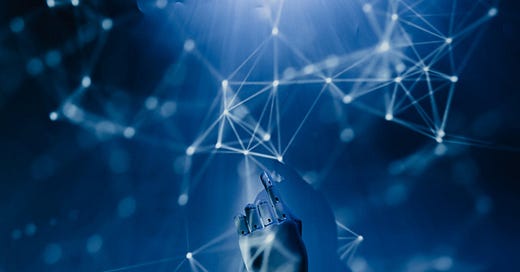
AI Bridges the "Felt" Gap Between God and Humans
God can speak and it happens. Now we can too (at least in the digital realm).
God does whatever he wants. He wills it, and it happens. He speaks a word, and it comes into being. Humans have always known that although they may wish, want, or speak about something, it will not become true unless they put in some work; we call it "sweat equity."
And while there have been some exceptions to this rule, as in the case of leaders or kings who feel as though they have divine power by commanding those under them to fulfill their wishes, there is always evidence of human effort behind it: the artisan, the craftsman, the building, the soldiers, the wars.
The Age of AI
Something has changed in our era. We now have a computer interface, and we can tell that interface—this large language model—what we desire, and we see nothing except for perhaps a prompt that tells us to wait, and then the thing that we desire or want comes into being.
Do you want an image of yourself that looks like Studio Ghibli? Do you want a chart with particular data? Do you want to know some fact or organize some idea or code some program? You simply speak it, and it is.
And while leaders and kings and rulers always had authority, they could see that effort was put into whatever they accomplished. I imagine those who constructed the pyramids were an obvious sign of the human effort behind it.
It feels different when you're looking at an AI. You don't see any work behind the scenes. You see a prompt, perhaps a flashing cursor, and all the things that had taken you hours of effort and typing and thought and reflection and research and whatever else simply appear before you.
The Coming Transformation
And now with advances in AI imaging and video technology, it seems like we are about to enter into a world where some of the even more tactile arts like filmmaking and photography and marketing will soon be replaced by you simply speaking the right words and chanting your desire. There it is, it appears on your screen.
I am not sure whether this is a good or a bad thing. I want to hope that it is a good thing that frees up humans to pursue things that they truly love, but as any advance in technology and productivity has shown us over the years, that which promises to simplify our life often makes it more difficult.
The Paradox of Progress
Email, land-line phones, and cell phones now mean we can labour outside of work hours. The office because we can be accessible anywhere. Work from home means that you can work at all hours, not just the ones committed when you clock in and clock out. The ability to make more if you just produce more creates a sort of addictive habit of doing more, so the more productivity we have, the more we want to do.
No, I am not sure that this new change in AI technology will have the effect that we hope it will. I suspect, although I do not know, it will give us in the short term a God-like feeling that we can do all things simply by uttering a word, and it comes into (digital) being. But by this pursuit of divine power, we may find that we become entrapped, unable to think our way out of the need to use AI for all things.
The Risk of Dependency
With writing or email communication or coding, we could find that we become prompt-makers for the machine that has now taken over what we used to learn through effort and work.
The work involved here made us into a new kind of person—to become the kind of person who can code and write an email and communicate verbally and in written form. But now, we may become enslaved to the very thing that promised us freedom.
I don't know the future. I do wonder, though, about what comes next.






